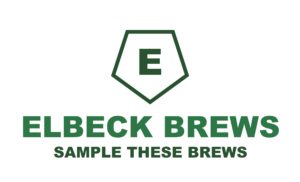 They may not have an address, but Elbeck Brews officially has beer. I profiled Edmonton’s fledgling contract brewery on my CBC column on Friday. You can listen to it here. This is a follow-up of my initial introduction on this site a few months ago (find here). Basically I save my CBC profiles until there is actually beer available for thirsty listeners, radio being so ephemeral and all.
They may not have an address, but Elbeck Brews officially has beer. I profiled Edmonton’s fledgling contract brewery on my CBC column on Friday. You can listen to it here. This is a follow-up of my initial introduction on this site a few months ago (find here). Basically I save my CBC profiles until there is actually beer available for thirsty listeners, radio being so ephemeral and all.
The column talks about owner Bruce Sample’s long roots in Edmonton, both as a resident and as a brewer (home and commercial). It talks about how the name Elbeck Brews came to be and, importantly, tells the story of KGB Imperial Stout (which I reviewed here). I won’t recount the whole column here – that is what you have ears for. However, as a spoiler I will say that because the host was Rod Kurtz rather than Portia Clark we eschewed the on-air tasting (always a favourite part of the column) and suffering listeners had to listen to my ad-libbed description of the beer.
Here I want to briefly highlight the double-edged sword that is contract brewing. As a quick reminder, contract brewing is when a brewery – in this case Elbeck – contracts with an existing operation (Two Sergeants in this story) to brew their beer using their equipment and space. All sales and other issues are the responsibility of the client.
Alberta now has six contract breweries, four of whom utilize other Alberta breweries. The growing number suggests this model has some attraction. You can certainly see the advantages. You get product on the shelf with a much lower upfront cost. It gives you opportunity to build brand awareness and create cash flow. I suspect there is also a hope that success builds a stronger argument for potential investors because you can point to actual sales, rather than projections.
But it seems to me there are a few downsides as well. The first is lack of control and certainty. Even if the brewer brews their own beer (such as Sample does), you require the assistance of the contractor’s brewers since they know the system best. You can’t tweak things in the system to suit your style because it is not your system. Also, your are at the mercy of their brewing schedule. If the contractor gets busy you get bumped. This happened recently to Brauerei Fahr, who had to switch breweries. Outcast Brewing has achieved a bit more security by purchasing their own fermenters but they still have to work around Cold Garden’s brewing needs.
Also, I think contract brewing can slow down development of the desired brewery. You have split attention and only so much time in the week. Building a brewery takes a lot of work and time, fussing over details and chasing suppliers while at the same time watching cash. To do all that while also needing to make and sell beer can be daunting. My observation is that for many of the contract brewers plans for their actual brewery are moving slower than anticipated.
I am also not convinced having product on shelves helps attract investment that wouldn’t have been there otherwise. The type of people who invest in breweries know it is a longer term commitment – it takes years to make a brewery profitable. Deciding on contract brewing because you are under-capitalized worries me a touch, because I think that two years later you will still be under-capitalized.
I predict we will see more contract breweries pop up in Alberta, especially as we see more brick and mortar breweries open up, many of whom which will have excess capacity. Ontario, for example, has dozens of contract breweries, many of whom have no desire to open an actual brewery.
However, I believe it will continue to be a challenging road to travel. Elbeck Brews has put out some mighty fine beer so far. It remains to be seen whether that can be parlayed into a full brewery operation.


November 25, 2018 at 10:30 AM
Hi, you mentioned that there are 6 contract breweries in Alberta, can you give the names? Thanks